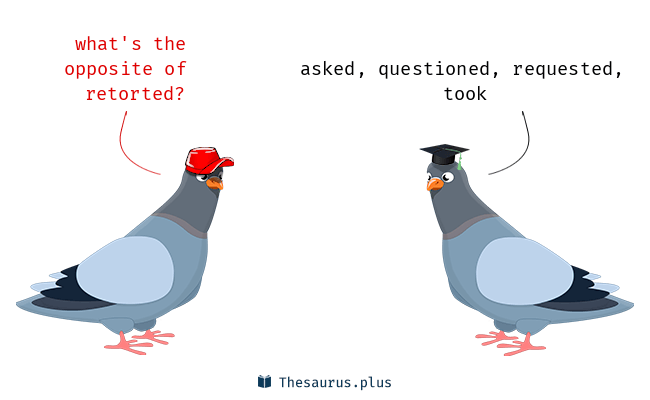
verb (used with object)
- to reply to, usually in a sharp or retaliatory way; reply in kind to.
- to return (an accusation, epithet, etc.) upon the person uttering it.
- to answer (an argument or the like) by another to the contrary.
noun
- a severe, incisive, or witty reply, especially one that counters a first speaker’s statement, argument, etc.
- the act of retorting.
noun
- Chemistry.
- a vessel, commonly a glass bulb with a long neck bent downward, used for distilling or decomposing substances by heat.
- a refractory chamber, generally cylindrically shaped, within which some substance, as ore or coal, is heated as part of a smelting or manufacturing process.
- an airtight, usually cylindrical vessel of fire clay or iron, used in the destructive distillation chiefly of coal and wood in the manufacture of illuminating gas.
- a sterilizer for food cans.
verb (used with object)
- to sterilize food after it is sealed in a container, by steam or other heating methods.
- Chemistry. to subject (shale, ore, etc.) to heat and possibly reduced pressure in order to produce fuel oil, metal, etc.
verb
- (when tr, takes a clause as object) to utter (something) quickly, sharply, wittily, or angrily, in response
- to use (an argument) against its originator; turn the tables by saying (something)
noun
- a sharp, angry, or witty reply
- an argument used against its originator
noun
- a glass vessel with a round bulb and long tapering neck that is bent down, used esp in a laboratory for distillation
- a vessel in which large quantities of material may be heated, esp one used for heating ores in the production of metals or heating coal to produce gas
verb
- (tr) to heat in a retort
1550s, “make return in kind” (especially of an injury), from Old French retort and directly from Latin retortus, past participle of retorquere “turn back, twist back, throw back,” from re- “back” (see re-) + torquere “to twist” (see thwart). Applied to exchanges of jest or sarcasm by c.1600, hence “say or utter sharply and aggressively in reply” (1620s). Related: Retorted; retorting.
“act of retorting,” c.1600, from retort (v.).
“vessel used in chemistry for distilling or effecting decomposition by the aid of heat,” c.1600, from Middle French retorte, from Medieval Latin *retorta “a retort, a vessel with a bent neck,” literally “a thing bent or twisted,” from past participle stem of Latin retorquere (see retort (v.)).
n.
- A closed laboratory vessel with an outlet tube, used for distillation, sublimation, or decomposition by heat.
- A glass laboratory vessel in the shape of a bulb with a long, downward-pointing outlet tube. It is used for distillation or decomposition by heat.
 Liberal Dictionary English Dictionary
Liberal Dictionary English Dictionary